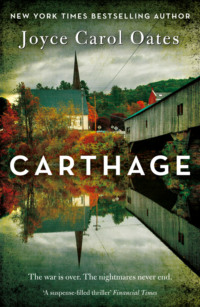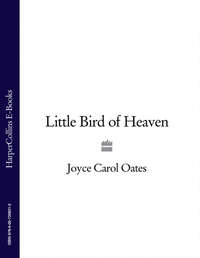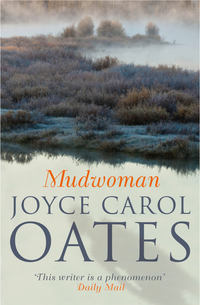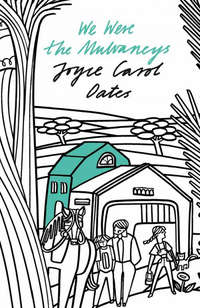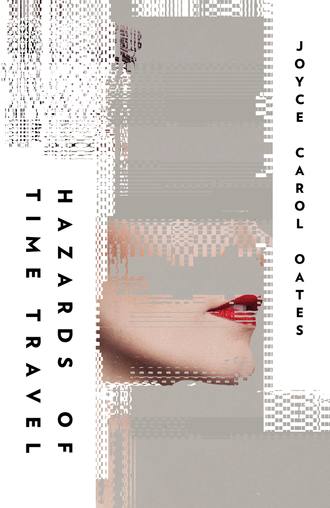
Полная версия
Hazards of Time Travel
AFTER TWO HOURS of interrogation it was decided that I was an “uncooperative subject.” In handcuffs I was taken by YD officers to another floor of Home Security which exuded the distressing air of a medical unit; there I was strapped down onto a movable platform and slid inside a cylindrical machine that made clanging and whirring noises close against my head; the cylinder was so small, the surface only an inch or so from my face, I had to shut my eyes tight to keep from panicking. The interrogators’ voices, sounding distorted and inhuman, were channeled into the machine. This was a BIM (Brain-Image Maker)—I’d only heard of these—that would determine if I was telling the truth, or lying.
Did your father—or any adult—write your speech for you?
Did your father—or any adult—influence your speech for you?
Did your father—or any adult—infiltrate your mind with treasonous thoughts?
Barely I could answer, through parched lips—No. No, no!
Again and again these questions were repeated. No matter what answers I gave, the questions were repeated.
Yet more insidious were variants of these questions.
Your father Eric Strohl has just confessed to us, to “influencing” you—so you may as well confess, too. In what ways did he influence you?
This had to be a trick, I thought. I stammered—In no ways. Not ever. Daddy did not.
More harshly the voice continued.
Your mother Madeleine Strohl has confessed to us, both she and your father “influenced” you. In what ways did they influence you?
I was sobbing, protesting—They didn’t! They did not influence me …
(Of course, this wasn’t true. How could any parents fail to “influence” their children? My parents had influenced me through my entire life—not so much in their speech as in their personalities. They were good, loving parents. They had taught Roddy and me: There is a soul within. There is “free will” within. If—without—the State is lacking a soul, and there is no “free will” that you can see. Trust the inner, not the outer. Trust the soul, not the State. But I would not betray my parents by repeating these defiant words.)
At some point in the interrogation I must have passed out—for I was awakened by deafening noises, in a state of panic. Was this a form of torture? Noise-torture? Powerful enough to burst eardrums? To drive the subject insane? We’d all heard rumors of such torture-interrogations—though no one would speak openly about them. Shaken and excited Roddy would come home from his work at Media Dissemination to tell us about certain “experimental techniques” Homeland Security was developing, using laboratory primates—until Mom clamped her hands over her ears and asked him to please stop.
The deafening noises stopped abruptly. The interrogation resumed.
But it was soon decided then that I was too upset—my brain waves were too “agitated”—to accurately register truth or falsity, so I was removed from the cylindrical imaging machine, and an IV needle was jabbed into a vein in my arm, to inject me with a powerful “truth-serum” drug. And again the same several questions were asked, and I gave the same answers. Even in my exhausted and demoralized state I would not tell the interrogators what they wanted to hear: that my father, or maybe both my parents, had “influenced” me in my treasonous ways.
Or any of my teachers. Or even Mr. Mackay, my enemy.
I’d been taken out of the hateful BIM, and strapped to a chair. It was a thick squat “wired” chair—a kind of electric chair—that sent currents of shock through my body, painful as knife-stabs. Now I was crying, and lost control of my bladder.
The interrogation continued. Essentially it was the same question, always the same question, with a variant now and then to throw me off stride.
Who wrote your speech for you? Who “influenced” you? Who is your collaborator in Treason?
It was your brother Roderick who reported you. As a Treason-Monger and a Questioner of Authority, you have been denounced by your brother.
I began to cry harder. I had lost all hope. Of all the things the interrogators had told me, or wanted me to believe, it was only this—that Roddy had reported me—that seemed to me possible, and not so very surprising.
I could remember how, squeezing my hand when he’d congratulated me about my good news, Roddy had smiled—his special smirking-smile just for me.
Congratulations, Addie!
“DISCIPLINARY MEASURE”
Next morning I was taken from my cell and returned to Youth Interrogation.
Half-carried from my cell, handcuffed and my ankles shackled, I was very very tired, very sick, scarcely conscious.
It was my hope that my parents would be waiting for me—that they’d been summoned to come get me, and take me home. I would accept it that I’d be forbidden to attend graduation—forbidden even to graduate from high school; I would accept it that I might be sent to a Youth Rehabilitation camp, as it had been rumored the boys at Pennsboro High had been, who’d been arrested by Youth Disciplinary. All I wanted was to see my parents—to rush at them, and throw myself into their arms …
Some months ago my parents had celebrated my seventeenth birthday with me. It had been a happy time!—but seemed now a lost, childish time. I had not felt like seventeen and now, desperate for my parents, I scarcely felt like a teenager at all.
Of course my parents were nowhere near. Probably they did not know what had happened to me. And I did not dare ask about them.
Instead I was being sternly informed: several Patriot Scholars had been arrested yesterday afternoon, simultaneous with my arrest, in a Youth Disciplinary “sweep.” After a season or more of relatively few such sweeps and seizes, YDDHS was “cracking down” on “potential subversives.”
These Patriot Scholars were graduating seniors from other high schools in the area. Their names, too, had been handed over to YDDHS by the principals of their schools. The question was put bluntly to me: Was I, Adriane Strohl, a collaborator with these students? Was I a co-conspirator?
Their names were told to me: I’d never heard of any one of them.
Their faces appeared on three overhead TV screens: I’d never seen any one of them before.
A camera was turned on me, in a blaze of blinding light. I had to assume that my frightened face was being beamed into other interrogation rooms, where the arrested Patriot Scholars were being held.
Repeatedly I was asked: Was I a collaborator with any one, or more, of these individuals? Was I a co-conspirator?
All I could answer was No.
Weakly, hopelessly—No.
CHEN, MICHAEL was a very young-looking Asian-American boy with sleek black hair worn to his collar and widened, very dark and alarmed eyes. He, too, had been named valedictorian of his graduating class, at Roebuck High School. A glance at CHEN, MICHAEL and you knew that this was a smart boy, probably ST3.
PADURA, LAUREN was a thick-bodied girl with a strong-boned if rather ashen face and damp eyes, probably ST2. She was sitting as upright as possible, though handcuffed and shackled at the ankles; she was a student at East Lawrence High. A glance at PARUDA, LAUREN, and you knew that this was a girl who thought for herself and very likely, in her classes, asked questions as I had.
ZOLL, JOSEPH JAY was a tall lanky dark-blond boy with a blemished face, thick glasses, and a small mustache on his upper lip, ST1 like me. He had been named salutatorian of his class at Rumsfeld High and looked like a math/computer whiz—one glance at ZOLL, JOSEPH JAY and you knew that here was a boy you wanted for your friend, whose kindness, patience, and computer expertise would be invaluable.
The four of us, on the TV monitors, were not looking great. Our eyes were bloodshot. Our mouths were trembling. Whatever we’d done, we regretted it. We didn’t look innocent. We didn’t any longer resemble high school seniors—we looked much younger. Just kids. Scared kids. Kids needing their mom and dad. Kids without a clue what was happening to them.
A panicked thought came to me—what if one of the Patriot Scholars suddenly confessed to “collaborating” with the rest of us? Would we all be executed?
A brisk voice informed us that we had thirty seconds to compose our confessions. At the end of these thirty seconds, if no one had confessed, one Patriot Scholar would be suitably “disciplined” with a Domestic Drone Strike (DDS)—on camera.
We were terrified—paralyzed. No one spoke.
Sleek-black-haired CHEN, MICHAEL opened his mouth and tried to speak, but no words came out.
There were tears, and agitation, in PADURA, LAUREN’S face—but no words issued from her mouth.
Then, I heard myself pleading, in a thin wavering voice, that we were not “collaborators”—we didn’t know one another, we’d never seen one another before, we didn’t know one another’s names …
Indifferently the off-screen voice was counting: eleven, sixteen, twenty-one … Twenty-seven, twenty-eight …
My heart was pounding so violently, I thought that it would burst. My eyes darted from one TV monitor to the others—as the Patriot Scholars trembled and cringed in their chairs, narrowing their eyes, yet unable to shut their eyes entirely.
On one of the screens there was a blinding flash. The boy with the mustache on his upper lip—ZOLL, JOSEPH JAY—was slammed sideways as if he’d been struck with a laser ray, that entered the side of his head like liquid fire, exploded and devoured his head, and then his torso and lower body, in less than three seconds.
What was left of ZOLL, JOSEPH JAY fell to the floor, slithering and phosphorescent, and by quick degrees this, too, vanished … I had a glimpse of the other Patriot Scholars staring in horror at their TV screens before all four screens went dark and a roaring in my ears became deafening.
When I woke from a sick, dead faint, I was being lifted from my chair. Yet so terrified still, I didn’t dare to open my eyes.
EXILE: ZONE 9
“Adriane. I am your Youth Disciplinary Counsel.”
She was a woman of about Mom’s age. Her face was shiny and glaring, so that I could barely look at her. Or maybe my vision had become oversensitive from the previous day’s interrogations in blazing light.
Her name was S. Platz. Her manner was almost jovial, as if she and I shared a joke.
“Try to lift your head and look at me, dear. As if you have nothing to hide. We are being ‘surveyed’ and videotaped—you must know.”
After the terror I’d been feeling, and the hopelessness, S. Platz was so astonishing to me, I couldn’t at first believe her; I was sure that she must be another torturer. Each time I closed my eyes I saw ZOLL, JOSEPH JAY struck down like an animal—or an “enemy” figure in a video game.
I would never forget that horrific sight, I thought.
I would never want to forget, for the executed boy’s sake.
S. Platz, unlike the other interrogators, did not continue to ask me the same questions, and she did not speak in a brisk impersonal voice.
She asked one of the uniformed officers to unshackle me—both my wrists and my ankles. She asked if my wrists and ankles hurt, and if I was “very tired” and would like to “sleep an uninterrupted sleep” in a real bed—to help with “healing.”
Almost inaudibly I said Yes.
(Wondering if “uninterrupted sleep” meant something terrible?)
But S. Platz seemed so kindly! Tears flooded my eyes, I was so grateful for her sympathy.
Yes thank you. Oh yes—I would like to sleep …
“I have good news for you, Adriane. Youth Disciplinary has ruled that the discipline for your violation of the federal statutes is—Exile.”
Exile! I had heard of Exile—of course. This form of discipline was often confused with Deletion because, so far as anyone knew, including the families of Exiled Individuals, the Exiled Individual simply—vanished.
It was said to be highly experimental, and dangerous. Exiled Individuals were teletransported—every molecule in their bodies dissolved, to be reconstituted elsewhere. (No one who was left behind knew where. A colony on another planet? This was a prevailing rumor, according to Roddy. But which planet? If any had been colonized by the Government, ordinary citizens knew nothing about it.) But often, the teletransportation failed, and individuals were injured, incapacitated, killed, or, in effect, “vaporized”—and no one ever saw them again.
Only if the Exiled Individual reappeared, years later, after having served out his sentence, could it be assumed that he had been alive all the while, but in a remote place. EIs were generally allowed to live but had to submit to a process of “Re-education” and “Reconstitution.”
Exile was considered to be the “humane”—“liberal”—disciplinary measure, appropriate for younger people who had not committed the most serious crimes—yet.
In our Patriot Social Studies class we were taught that the “Re-educated” and “Reconstituted” individual, successfully having completed his sentence of Exile and returned to the present time, designated EI1, was often an outstanding Citizen-Patriot; several notable EI1’s had been named to federal posts in Homeland Security Public Safety Oversight and Epidemic Control; and the most renowned of EI1’s had risen to a high-ranking executive post in the Capitol, as an assistant to the director of the Federal Bureau of Interrogation.
There were rumors that the president was himself an EI1—a former “traitor”-genius now totally converted to NAS and its democratic tradition.
S. Platz was saying: “Your case was carefully adjudicated, Adriane, after several of your teachers entered pleas for you. Their claim was that you are ‘naïve’—‘very young’—‘not subversive’—and ‘not radical’—and that, if you are separated from the influence of your MI-father and are allowed to Re-educate yourself, you would be of value to society. Therefore, we are transporting you to Zone Nine. There, you will attend an excellent four-year university to train yourself in a socially useful profession. Teaching is strongly suggested. Or, if your science grades are good, you would be allowed to apply to medical school. Zone Nine is not so ‘urban’ as our Eastern zones, nor is it so ‘rural’ as most of our North-Midwest zones. It is not on any NAS map—it is a place that ‘exists’ only by way of special access, for, in our present time, in the North-Midwest States that now encompass what was known as ‘Wisconsin’ in the era of Zone Nine, things are very different.” Seeing that I was looking confused and frightened, S. Platz said, “You need not concern yourself with any of this, Adriane—you will simply be transported to the university in Zone Nine, where you will be a ‘freshman.’ You will be given a new, abbreviated identity. You will be, as you are, seventeen years old. And your name will be ‘Mary Ellen Enright.’ If necessary, when you return to us your training can be brought up-to-date. Everything that you need to know is explained in The Instructions, which I will give you now.”
Though S. Platz spoke clearly I was having difficulty understanding. Badly wanting to ask But can I see my parents again? Just once before I am sent away …
S. Platz handed me a sheet of paper stiff as parchment. When I tried to read it, however, my eyes filled with moisture, and lost focus.
“So there is really no need to ask me questions—is there?”
S. Platz paused, smiling at me.
And now I saw that the counsel’s steel-colored eyes were not smiling, but only just staring, and assessing.
The realization came to me—If I don’t react properly, I will be vaporized on the spot. The woman has this power.
With a numb smile I managed to murmur Thank you!
And not a word about my parents. Or the life I would be leaving—the life to which I would be “lost.”
II
ZONE 9

She was a strange girl. At first, we didn’t like her.
She never smiled at us. Her face was like a mask. She prayed on her knees—we’d seen her! She cried herself to sleep every night like us, only worse.
We were all homesick, our first semester at Wainscotia. Missed our parents and our families so! But this girl was sad in a way we weren’t—like her heart was broken. And she would not be comforted—which does not seem natural.
We were Christian girls, mostly Protestant. We attended chapel on Sundays. (She never did—we noticed that.) We believed in prayer—seriously!
We believed in helping one another. We believed in smiling-through-tears. You cried, and then you laughed—you opened a box of brownies your mom had sent to you, to share with your roommates, or anyone who showed up in the room.
You cried, and wiped away your tears—and you were yourself again.
She was the girl who scorned our mothers’ brownies, and scorned the opportunity to walk with us to class on the steep-hilly sidewalks leading into the campus, who almost never came with us to the dining hall and sat with us. She’d gone to freshman orientation alone, and slipped away alone. The only girl in Acrady Cottage who didn’t participate in Vesper Song.
Probably the only person in the freshman class who claimed she’d “lost” her green-and-purple freshman beanie. Who paid no heed to upperclassmen ordering her to “step out of the way, frosh”—stared through them as if she didn’t see them and kept walking in her stiff-hunched way like a sleepwalker you pitied and would not want to waken.
The girl-with-no-name we called her. For if you called out a cheery Hi there, Mary Ellen!—she didn’t seem to hear, or to register the name, even as she quickened her pace hurrying away.
We knew little about her. But we knew that she was a scholarship girl, like us.
Acrady Cottage was a residence for freshman scholarship girls—meaning that most of us couldn’t have afforded Wainscotia State except for financial aid and part-time jobs on campus.
(She had a part-time job in the geology library.)
Scholarship girls were thrifty girls! Most of our textbooks were used—some of them pretty badly battered.
We wore hand-me-down clothes and clothes sewn by our mothers or grandmothers—or by us.
Quite a few of us were 4-H girls. We were three Wisconsin State Fair blue-ribbon winners, in Acrady Cottage.
Acrady wasn’t a residence hall like the ivy-covered stone buildings elsewhere on campus—it was just a house, plain weathered-gray shingle board, where freshman girls lived who could not afford to live anywhere else.
But Acrady Cottage had spirit!
At Vesper Song, Acrady excelled though we were one of the smaller residences on campus—twenty-two girls.
Twenty-two girls including “Mary Ellen”—the girl who kept to herself like someone in quarantine.
First week at Wainscotia we were all homesick. But trying to be cheerful—“friendly.”
Not her—“Mary Ellen Enright.”
She’d avoid us if she could. Her own roommates!—that isn’t easy.
Four of us in the third-floor room. Cramped space and just two (dormer) windows.
She’d taken the bed that was farthest, in a corner. And her desk jutted out from the wall, to partially hide the bed from the rest of the room. No window in that corner.
She’d shrink from us. Trying to smile—a weird bright smile that didn’t reach her eyes.
And then, when she thought we were asleep and wouldn’t see her, on her knees in the corner, praying.
And crying herself to sleep.
She looked like someone who has traveled a long journey and has not fully recovered.
We’d wondered—Is she foreign?
But what kind of foreign?
Even the way she spoke was strange. If you cornered her to say hello and ask how she was and she couldn’t escape or avoid answering she would stammer a reply that was almost—but not quite—intelligible. We could recognize in her speech the rhythms and vowel-sounds of English, so if we didn’t exactly know what she was saying, we could guess.
And she spoke so fast and nervous! Like none of the other girls of Acrady Cottage.
Of course, we were all from the Midwest. Most of us from Wisconsin. Where Mary Ellen was from was—one of the eastern states, we’d been told. Evidently people talked faster there.
Our part of the U.S., it’s generally known as the Happy Place. (Midwest!) And Wainscotia is a very special university at the heart of the Happy Place.
This girl Mary Ellen, we had to wonder: Was she a Christian?
Was she—Jewish?
None of us from Wisconsin had ever seen a Jewish person, before coming to Wainscotia. But there were Jewish people here—professors, it was said, as well as students. A few.
There was even a Jewish fraternity, and there was a Jewish sorority. So they could live with their own kind. This was amazing to us!
In large cities in Wisconsin, like Milwaukee, and Madison, there were Jewish people—we knew that. But we were mostly from upstate Wisconsin, or rural counties. German, Scandinavian, Scots and Irish backgrounds—and English of course.
Also, “Mary Ellen” did not look like us. This was difficult to explain, but we all agreed. Her hair was darkish blond, spiky like it hadn’t been combed or brushed properly; never curled or waved, and not washed often enough. It needed cutting, and trimming. And she went to bed without hairpins or rollers. Ever.
Didn’t do anything for her hair. Didn’t even seem to recognize what rollers were!
(Like she didn’t seem to know how a phone worked—the way you dial with your forefinger. Of all of us in Acrady Cottage, only Mary Ellen would shrink from answering the phone when it rang near her, so we had to wonder—was it possible her family didn’t own a telephone?)
(And she didn’t smoke! And was forever coughing from our cigarette smoke—coughing in fits, until her eyes watered—though she never complained as you’d have expected a nonsmoker to complain. You could see the misery in her face but it was what you’d call long-suffering misery.)
She might have been pretty—almost—except she never wore lipstick. A guy looking at her would look right past her, there was so little to catch the male eye. (We all wore red—very red—lipstick!) She didn’t even pluck her eyebrows which is about the least a girl can do, to make herself attractive.
She looked like a convalescent. Some wasting disease that left her skinny, and her skin ashy-pale and sort of grainy as if it would be rough to the touch like sandpaper. Her eyes would have been beautiful eyes—they were dark-brown, like liquid chocolate—with thick lashes—but they were likely to be narrowed and squinting as if she were looking into a bright, blinding light. And she did not look you in the eye—like a guilty person.



